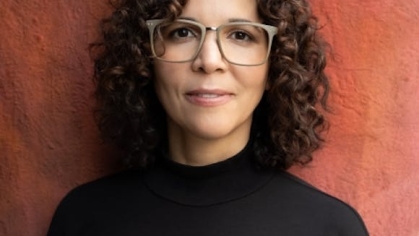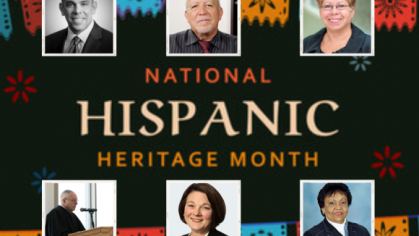What a difference a decade – and Rutgers University-Newark -- can make.
In 2004 Flomo Kokro was a young man involved in drug sales and gang wars, who had seen friends violently killed and spent time in jail, not once but several times. His future, it seemed, held nothing but a life on the troubled streets in his hometown of Trenton.
Flash forward 10 years and meet the “new” Flomo Kokro, a proud 2014 graduate of the Newark College of Arts and Sciences and the Garden State LSAMP program, holding a bachelor of arts in mathematics. Now a Ewing, N.J., resident, Kokro has been accepted into a “Bridges to Doctorate” program at California State University, Los Angeles, where he will be working toward a doctorate in applied mathematics. His career goals include research in alternative energy and teaching on a collegiate level.
The years in between are filled with pain, regret and confusion that slowly evolved into hope and determination. How Kokro bridged the gap is a testament to his character and to his years at Rutgers University-Newark and especially, to Dr. Alexander Gates and the professors and staff in the LSAMP program (Louis Stokes Alliance for Minority Participation). This initiative of the National Science Foundation aims to increase minority student success in the fields of science, technology, engineering and mathematics. Gates heads the Garden State LSAMP program, a consortium of seven public and private colleges in New Jersey, as well as Rutgers University-Newark and Rutgers University-New Brunswick campus.
As Kokro tells it, his early life was rich and promising. His parents immigrated to New Jersey from Liberia in the mid-1970s, and he and two sisters were born and raised in Trenton. Early on he had a passion for mathematics and engineering. He would take apart appliances to “see how they functioned,” he recalls, and would repair televisions, radios, and other appliances.
He qualified for his middle school’s gifted and talented program, where he thrived both academically and in sports. He even excelled in the Boy Scouts.
Sadly, his high school “could not afford me the same academic structure,” and Kokro floundered, and “slipped into the same pitfalls as many other urban high school students.” At the same time, his father fell ill, and Kokro traded extracurricular activities for jobs to help his family economically. Like Kokro, his neighborhood also slid downhill; homes were abandoned as drugs, gangs and crime crept in.
“The outside influences became too great,” he recalls, and he became ensnared in the drugs and violence, leading to several arrests and imprisonments.
By 2005, Kokro had enough and “made a promise” to himself to seek out a better life and become a better person. He went to the local community college, graduating with a high average, then took some courses at a large university, but felt lost, so he dropped out.
But the death of a very close friend – a death Kokro blames on senseless gang violence – inspired him to return to college. Fortunately Kokro had a friend who loved attending Rutgers University-Newark, and after several visits to the campus, Kokro registered in fall 2011, attracted to the “small community feel” and warmth of the people he met, both students and faculty. He learned about the LSAMP program during his first semester, and eagerly joined. “I was surrounded by students in the same fields of study, students who helped me learn good study habits,” he says, as well as by professors and staff “who wanted me to succeed.” Academic support in the form of programs like an Academic Success Boot Camp in pre-calculus and physics also helped him immensely.
Kokro also found a willing mentor in Gates, who advised him and encouraged him. “Dr. Gates pushed me toward grad school, and always had an open door policy for all of us students,” he states.
During his years at RU-N, Kokro became an ambassador for LSAMP, recruiting other students. He also tutored fellow RU-N students in mathematics, and mentored high school students during two summer internships. Yet another internship exposed him to neuroscience research, at the RU-N Center for Molecular and Behavioral Neuroscience.
The man he has become, Kokro reflects, is a far cry from the boy in the inner city. Quoting American author Napoleon Hill, he notes, “Every adversity, every failure, and every heartache, arrives with the seed of an equivalent or greater benefit.” Through his education, Kokro plans to grow as an individual and community servant. He hopes his story “serves as a testament to people of all backgrounds, that with God’s good grace and a bit of fortitude, all things become possible.” He gives credit to his loving and supportive family, to his religious beliefs, and to higher education. “The experience of college gave me structure, discipline, knowledge and good habits.”
Kokro is living proof that the hardest lessons to learn, and toughest tests to pass, come from life itself, not a classroom. He also is proof that even the most difficult lessons and tests can be conquered.
ABOUT THE GS-LSAMP
(GARDEN STATE - LOUIS STOKES ALLIANCE FOR MINORITY PARTICIPATION)
GS-LSAMP provides participating students with opportunities and resources to help ensure their success in STEM (Science, Technology, Engineering and Math) majors, as well as holistic educational experiences to effectively explore and succeed in STEM majors and careers. Rutgers University-Newark is the lead school in the nine-college GS-LSAMP alliance, and has just received a $3.5 milion grant to continue the program through 2019. The program creates a learning community that includes tutoring, assistance in obtaining research opportunities and internships, career advisement, stipend support, research experiences, and financial aid information for graduate school applicants.
For more information on GS-LSAMP go to http://gslsamp.rutgers.edu/.


